Related Research Articles
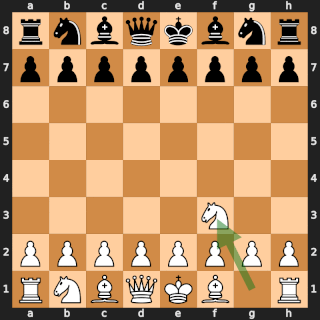
The Game of the Century is a chess game that was won by the 13-year-old future world champion Bobby Fischer against Donald Byrne in the Rosenwald Memorial Tournament at the Marshall Chess Club in New York City on October 17, 1956. In Chess Review, Hans Kmoch dubbed it "The Game of the Century" and wrote: "The following game, a stunning masterpiece of combination play performed by a boy of 13 against a formidable opponent, matches the finest on record in the history of chess prodigies."

John Denis Martin Nunn is an English chess grandmaster, a three-time world champion in chess problem solving, a chess writer and publisher, and a mathematician. He is one of England's strongest chess players and was formerly in the world's top ten.

Joseph Gerald Gallagher is a British-born Swiss chess player and writer. He was awarded the title of Grandmaster by FIDE in 1990 and has been the national champion of both Britain and Switzerland.
The Slav Defense is a chess opening that begins with the moves:
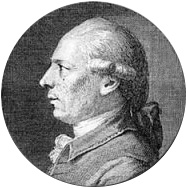
The Philidor position is a chess endgame involving a drawing technique for the defending side in the rook and pawn versus rook endgame. This technique is known as the third-rank defense due to the positioning of the defending rook. It was analyzed by François-André Danican Philidor in 1777. Many rook and pawn versus rook endgames reach either the drawn Philidor position or the winning Lucena position. The defending side should try to reach the Philidor position; the attacking side should try to reach the Lucena position. Grandmaster Jesús de la Villa said, "[The Lucena and Philidor positions] are the most important positions in this type of endgame [...] and in endgame theory."

Karsten Müller is a German chess Grandmaster and author. He earned the Grandmaster title in 1998 and a PhD in mathematics in 2002 at the University of Hamburg. He had placed third in the 1996 German championship and second in the 1997 German championship.
Frank Lamprecht is a German chess International Master and chess trainer. He is a co-author of Fundamental Chess Endings (2001) and Secrets of Pawn Endings (2000), both with Karsten Müller.

John Michael Emms is an English chess Grandmaster and chess author. He tied for first in the 1997 British Championship. He was the 2002 captain of the English Olympiad team. In October 2004, he also coached a woman's team in the 36th Chess Olympiad in Calvià, Majorca.
The Siberian Trap is a chess opening trap. After a series of natural moves in the Smith–Morra Gambit of the Sicilian Defence, White can lose a queen. The name appears to result from Boris Schipkov of Novosibirsk in southwestern Siberia.
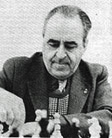
Yakov Borisovich Estrin was a Russian chess player, chess theoretician, writer, and World Correspondence Chess Champion who held the chess titles of International Master and International Correspondence Chess Grandmaster.
Much literature about chess endgames has been produced in the form of books and magazines. A bibliography of endgame books is below.
In chess, a king walk, also known as a king march, steel king, or wandering king, is a maneuver where the king travels a large distance to a different part of the board in the middlegame or opening. During a king walk, the king may travel along its own side of the board to reach a safer position. Alternatively, it may travel up the board, often involved in a mating attack against the opposing king.
In a chess endgame of a king, bishop, and pawn versus king, a wrong rook pawn is a rook pawn whose promotion square is the opposite color from the bishop's square color. Since a side's rook pawns promote on opposite-colored squares, one of them may be the "wrong rook pawn". This situation is also known as having the wrong-colored bishop or wrong bishop. In many cases, the wrong rook pawn will only draw, when any other pawn would win. This is because the defending side can sometimes get their king to the corner in front of the pawn, after which the attacking side cannot chase the king away to enable promotion. A fairly common defensive tactic is to reach one of these drawn endgames, often through a sacrifice.
Vladimir Sergeyevich Antoshin was a Soviet chess Grandmaster, a theoretician and a national champion of correspondence chess.
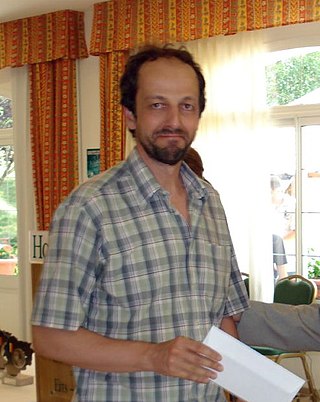
Anthony Cornelis Kosten is an English-French chess Grandmaster and chess author.
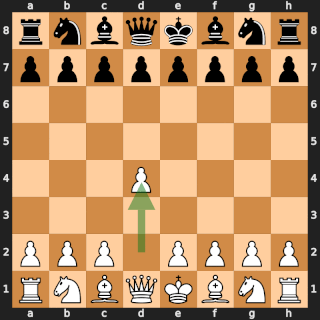
On 22 November 1938, Mikhail Botvinnik defeated José Raúl Capablanca in one of the most famous games in chess history. The game was played in round 11 of the AVRO tournament in Rotterdam. Capablanca was a former World Chess Champion (1921-27), while Botvinnik would later become World Champion himself (1948-57).
References
- Burgess, Graham (2000). The Mammoth Book of Chess (second ed.). Carroll & Graf Publishers. ISBN 0-7867-0725-9.
- ↑ "DSDA Player Profile: Grazza". The DooMed Speed Demos Archive. Archived from the original on 25 October 2018. Retrieved 17 March 2023.
{{cite web}}: CS1 maint: unfit URL (link)